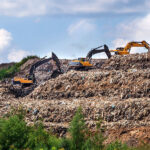Top: King County, Washington’s South Treatment Plant, which anaerobically digests biosolids and then upgrades the biogas to RNG. Photos courtesy of King County
The Washington State Legislature passed Clean Fuels Program legislation in April, paving the way to establishing a low carbon fuel standard to reduce greenhouse gas emissions. On May 17, Gov. Jay Inslee sign the legislation into law. Transportation accounts for nearly 45% of Washington’s greenhouse gas emissions, according to the state Department of Ecology.
The Clean Fuels Program (CFP) is designed to reduce the carbon intensity of transportation fuel — similar to the intent of California’s Low Carbon Fuel Standard (LCFS) and Oregon’s Clean Fuels Program. The bill requires reductions in the carbon intensity (CI) of transportation fuels of 20% below 2017 levels by 2038, with carbon reduction requirements increasing by 0.5% each year in 2023 and 2024, and then 1.5% per year in 2028 through 2031.
“While the goals for the program are ambitious and good for the biogas and the renewable natural gas (RNG) industry, some amendments added throughout the legislative process could prove to be obstacles in the years to come,” notes Patrick Serfass, Executive Director of the American Biogas Council (ABC). He cites two examples:
- Linkage to a potential Transportation Department revenue package: One amendment added in the Senate that remained in place after the conference session requires that no compliance obligations or credit generation may start until a separate, additive transportation revenue act is enacted in which the state fuel tax is increased by at least an additional $0.05 per gallon. According to an Oregon Public Broadcasting story, “The package must generate more than $500 million every two years. The new clean fuels bill says the standards (and therefore, the transportation package) must start no later than Jan. 1, 2023.”
- In state requirement: By January 1, 2028, no CI reduction increases will be required beyond the initial 10% until and unless there is at least a 15% net increase in the volume of in-state liquid biofuel production and the use of feedstocks produced within the state. These volumes are relative to the levels of production at the start of the CFP, according to ABC. Additionally, no new increases to the standards will be allowed until at least one new or expanded biofuel production facility representing an increase in product capacity or production over 60 million gallons of biofuels per year is operating.
The Washington State Department of Ecology is tasked with developing the administrative details of the CFP, similar to how the California Air Resources Board administers the state’s LCFS. Existing Washington state projects producing RNG from anaerobic digester biogas include the King County South Treatment Plant and George DeRuyter and Sons Dairies in Outlook.













